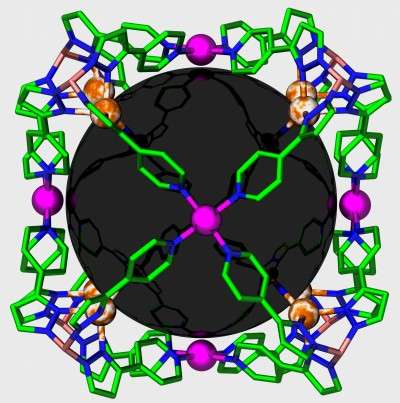Supramolecules spin promises for future

(Phys.org)—Microscopic particles that can be made to switch their magnetic state could mean computers of the future will be able to store much more data in much less space.
A family of supramolecules that possess this "spin crossover" capacity, along with some other interesting attributes, have attracted the attention of Professor Stuart Batten of the School of Chemistry at Monash University.
The tiny "nanoballs", described in a paper published recently in ChemPlusChem by Professor Batten's research team, are about three-billionths of a metre wide – and extraordinarily versatile.
"The nanoballs are the largest molecules known to show spin crossover, only the second example of these types of molecules showing absorption of hydrogen, and the only materials known to show both these properties as well as the absorption of carbon dioxide," Professor Batten said.
Much of Professor Batten's wider research involves crystal engineering to learn how particular molecules behave, and the creation of new materials based on that knowledge. The significance of his work is underlined by funding grants from the Australian Research Council, including a Future Fellowship and a number of Discovery grants.
His team stumbled across the nanoballs when they were analysing what they thought was a different molecule, using X-ray crystallography at the Australian Synchrotron.
"Once we saw the structure and worked out how it was built, we could make variations of it," Professor Batten said.
The team found that the supramolecules would absorb hydrogen or carbon dioxide, but not methane, so they could possibly be used to separate gases. They were also shown to make certain reactions go faster.
And because the nanoballs can be made to shift magnetic states, for example in response to changes in light, they have potential use in computer data storage, which relies on the binary system.
Different magnetic states are used in computers to represent the zeroes and ones the binary system requires.
"If you want to make hard drives that can store more and more information, you need to make the regions storing the information smaller and smaller," Professor Batten said.
Molecular data storage may be a long way from reality. At present spin crossover only occurs at extremely low temperatures – less than minus 220 degrees. But the promise is there.
"Ultimately, if we can coax the molecules to behave at the right sort of temperatures, then we might be storing our ones and zeroes in individual molecules," Professor Batten said.
Provided by Monash University

















